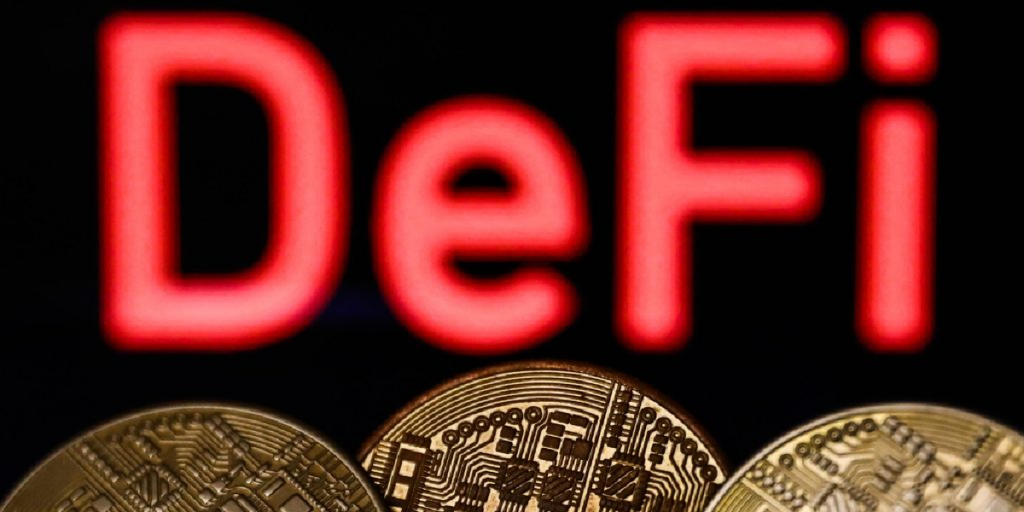Blockchain technology has enabled the creation of a new class of financial applications known as decentralized finance (DeFi). Unlike traditional finance, which is controlled by central institutions such as banks and governments, DeFi is decentralized and open-source, allowing anyone to access and use these applications without intermediaries. DeFi offers a wide range of financial services, such as lending, borrowing, trading, and payments, all without the need for intermediaries. This makes DeFi more transparent, secure, and accessible, and has the potential to disrupt the traditional financial system. How DeFi related to betting industry? What is the best DeFi crypto? All answers below.
Check out our latest post about DeFi100.

FAQ
What is DeFi and how does it differ from traditional finance?
DeFi, or Decentralized Finance, refers to the use of blockchain technology and smart contracts to provide financial services that are typically offered by traditional financial institutions. DeFi differs from traditional finance in that it is decentralized, meaning that it is not controlled by any single authority or institution.
How is DeFi changing the way people bet?
DeFi is changing the way people bet by providing them with decentralized and transparent platforms for betting. These platforms allow users to bet on a wide range of events using cryptocurrencies, which can be traded and used in a trustless manner.
What are some examples of DeFi-powered betting platforms?
- Augur: decentralized prediction market platform
- FunFair: blockchain-based platform for casino games
- Wagerr: decentralized sports betting platform
These platforms use smart contracts to enable peer-to-peer betting and provide users with transparent and secure ways to place bets.
What are the main benefits of DeFi in the crypto betting industry?
The main benefits of DeFi in the crypto betting industry are that it allows users to bet in a decentralized and transparent manner, and it provides them with access to a wider range of betting options. DeFi also offers users the ability to trade and use cryptocurrencies in a trustless manner, which can provide them with greater control over their funds and investments.
What are the challenges and limitations of DeFi in the crypto betting industry?
The challenges and limitations of DeFi in the crypto betting industry include the complexity of the technology and the need for users to have a certain level of technical knowledge. Additionally, DeFi platforms may be subject to security vulnerabilities and other risks, which can make them less attractive to some users.
DeFi differs from traditional finance in several important ways.
- Firstly, DeFi is built on blockcha
- in technology, which enables it to be decentralized and open-source. This means anyone can access and use DeFi applications without intermediaries, such as banks or other financial institutions. In contrast, traditional finance relies on central institutions to control and manage financial transactions and services.
- DeFi is transparent and auditable, as all transactions are recorded on a public blockchain. In contrast, traditional finance is often opaque, with little visibility into how transactions are processed and managed.
- Finally, DeFi has the potential to offer greater accessibility and inclusion, as it allows anyone with an internet connection to access financial services, regardless of their location or economic status. In contrast, traditional finance is often restricted to particular individuals or institutions.
The rise of DeFi in the crypto betting industry
DeFi is transforming the betting industry by introducing decentralized platforms. These platforms use smart contracts and other blockchain technologies to enable users to place bets transparently and securely. DeFi platforms are decentralized and open-source, giving users more trust and confidence than traditional centralized platforms that can be prone to fraud or corruption. DeFi platforms also typically have lower fees and higher returns on investment, making them attractive to many users. Additionally, DeFi platforms can be accessed by anyone with an internet connection, increasing accessibility and inclusion in the betting world.
Several examples of DeFi-powered betting platforms are gaining popularity in the crypto betting industry.
- Augur: decentralized prediction market platform
- FunFair: a blockchain-based platform for casino games
- Wagerr: decentralized sports betting platform
These platforms are changing how people bet and offering a more transparent, secure, and accessible alternative to traditional venues.
The benefits of DeFi in the crypto betting industry
Let’s talk about the benefits of DeFi in the crypto betting industry. There are three main benefits: increased transparency and security, greater accessibility and inclusions, and the potential for higher returns on investment.
Increased transparency and security
DeFi in the crypto betting industry offers increased transparency and security as a key benefit. Because DeFi is built on blockchain technology, all transactions are recorded on a public ledger transparently and auditably. This lets users see exactly how their bets are processed and eliminates room for fraud or corruption. In contrast, traditional betting platforms are often opaque and vulnerable to insider trading and other misconduct. Additionally, DeFi-powered betting platforms use smart contracts and other blockchain technologies to secure users’ funds and ensure fair and transparent bet processing. This gives users greater trust and confidence in the betting process and reduces the risk of fraud or loss.
Greater accessibility and inclusion
Another benefit of DeFi in the crypto betting industry is greater accessibility and inclusion. Because DeFi-powered betting platforms are decentralized and open-source, anyone with an internet connection can access them, regardless of location or financial status. This means that users who may not have access to traditional betting platforms, such as those in countries with strict gambling laws or those who are unbanked, can participate in the world of betting through DeFi. DeFi-powered platforms also often have lower barriers to entry, allowing users to start betting with smaller amounts of money. This makes DeFi-powered platforms attractive to users who may not have the financial resources to participate in traditional platforms. Overall, DeFi offers the potential for greater accessibility and inclusion in betting.
The potential for higher returns on investment
Another potential benefit of DeFi in the crypto betting industry is the potential for higher returns on investment. Because DeFi-powered platforms are decentralized and open-source, they often have lower fees and overhead costs than traditional platforms. This means that users can earn higher returns on their bets, as more money goes towards the actual bet instead of being eaten up by fees. DeFi-powered platforms also often offer a wider range of investment opportunities, such as earning interest on deposited funds or investing in decentralized autonomous organizations (DAOs). This gives users more options to make returns on their investments and can lead to higher returns than traditional platforms.
The challenges and limitations of DeFi in the crypto betting industry
Let’s talk about challenges and limitations of DeFi in the crypto betting industry.

The risks of DeFi
The lack of clarity in the law can create uncertainty for users and businesses operating in the DeFi space, as they may need clarification on what is allowed or prohibited. DeFi is a relatively new and rapidly evolving field, and as such, it is not without its risks. For example, DeFi-powered betting platforms may be vulnerable to hacking or other forms of cyberattack, which could result in the loss of users’ funds. Also check out about crypto mistakes to avoid.
Additionally, using smart contracts and other complex technology in DeFi-powered betting platforms can introduce new risks, such as the potential for bugs or other technical errors. Furthermore, the decentralized nature of DeFi means that there is little recourse for users who experience losses or other problems, as there are no central authorities to turn to for help. These risks can make DeFi-powered betting platforms less attractive to users, who may be hesitant to entrust their funds to this technology.
Regulatory uncertainty
Another challenge and limitation of DeFi in the crypto betting industry is regulatory uncertainty. Because DeFi is a relatively new and rapidly evolving technology, there is currently little guidance or regulation to govern its use. The lack of clarity in the law can create uncertainty for users and businesses operating in the DeFi space, as they may need clarification on what is allowed or prohibited. Additionally, the decentralized nature of DeFi means that it is difficult for regulators to enforce compliance, as there are no central authorities to oversee the activities of DeFi-powered betting platforms. This regulatory uncertainty can create risks and barriers to adopting DeFi in the crypto betting industry. Users and businesses may hesitate to use this technology without clear rules and guidance.
The potential of DeFi in the crypto betting industry
Despite the challenges and limitations of DeFi in the crypto betting industry, there is also a lot of potential for this technology to disrupt and transform the way people bet. DeFi-powered betting platforms offer a transparent, secure, and accessible alternative to traditional betting platforms, providing users with greater trust and confidence in the betting process. DeFi-powered betting platforms can offer higher returns on investment, as they often have lower fees and overhead costs. Furthermore, using blockchain technology in DeFi-powered betting platforms can enable new forms of betting and investment, such as earning interest on deposited funds or investing in decentralized autonomous organizations (DAOs). Overall, the potential of DeFi in the crypto betting industry is significant and could lead to major changes in the way people bet in the future.

The role of DeFi in the broader context of the financial industry.
The role of DeFi in the broader context of the financial industry is to provide a more transparent, secure, and accessible alternative to traditional finance. By leveraging blockchain technology, DeFi-powered platforms can offer various financial services, such as lending, borrowing, trading, and payments, without intermediaries. This has the potential to disrupt the traditional financial system by providing more excellent choices and control to users. Additionally, the transparency and auditability of DeFi can help to reduce the risks of fraud and corruption in the financial industry. Furthermore, the accessibility and inclusion of DeFi can provide financial services to individuals and communities who may not have access to traditional finance. Overall, the role of DeFi in the financial industry is to offer a more transparent, secure, and accessible alternative to conventional finance.
So what is the best Defi crypto?
It is difficult to determine the best DeFi crypto. The DeFi market is constantly evolving, and there are many different projects to choose from. Ethereum and MakerDAO are among the most popular DeFi projects. DeFi applications widely use Ethereum as their blockchain. MakerDAO is a decentralized lending platform that uses Dai to provide low-risk loans to users. Other notable DeFi projects include Compound, decentralized lending, and borrowing platform. The 2nd one is Uniswap, a decentralized exchange for trading cryptocurrencies. These are just a few examples of the many DeFi projects currently available. The best one for you will depend on your specific needs and preferences.